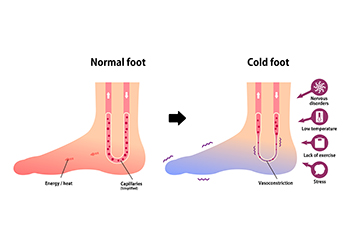Cold Toes May Indicate Raynaud’s Phenomenon
Tuesday, 04 April 2023 00:00
A condition known as Raynaud’s phenomenon is a circulatory problem that causes the blood vessels in the extremities to narrow and restrict blood flow. This can cause the toes to become cold and even turn blue. There are two types of Raynaud’s phenomenon, primary and secondary. Primary has no known cause, but secondary may occur in conjunction with another underlying condition, such as lupus or rheumatoid arthritis. This type is far more serious and can lead to the formation of skin ulcers that may become gangrenous if ignored. Women are more at risk for Raynaud’s phenomenon, and it usually occurs in people in their 30s or younger. Emotional stress and smoking also can trigger attacks. When an attack occurs, the toes become exceedingly cold and may change color, which can evolve into burning and tingling when the toes finally get warmer. If you are having increasing problems with coldness and discoloration in the toes, it is suggested that you meet with a podiatrist who can properly diagnose your condition and offer treatment options.
While poor circulation itself isn’t a condition; it is a symptom of another underlying health condition you may have. If you have any concerns with poor circulation in your feet contact one of our podiatrists of Accent Podiatry Associates. Our doctors will treat your foot and ankle needs.
Poor Circulation in the Feet
Peripheral artery disease (PAD) can potentially lead to poor circulation in the lower extremities. PAD is a condition that causes the blood vessels and arteries to narrow. In a linked condition called atherosclerosis, the arteries stiffen up due to a buildup of plaque in the arteries and blood vessels. These two conditions can cause a decrease in the amount of blood that flows to your extremities, therefore resulting in pain.
Symptoms
Some of the most common symptoms of poor circulation are:
- Numbness
- Tingling
- Throbbing or stinging pain in limbs
- Pain
- Muscle Cramps
Treatment for poor circulation often depends on the underlying condition that causes it. Methods for treatment may include insulin for diabetes, special exercise programs, surgery for varicose veins, or compression socks for swollen legs.
As always, see a podiatrist as he or she will assist in finding a regimen that suits you. A podiatrist can also prescribe you any needed medication.
If you have any questions, please feel free to contact our offices located in Arlington and Mansfield, TX . We offer the newest diagnostic and treatment technologies for all your foot care needs.




